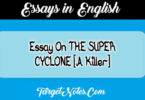
Contents
Dickens is not only a spokesman of his age but also a critic.Discuss with special reference to ‘Oliver Twist’.
Charles Dickens was one of the most important social critic who used fiction effectively to criticize economic, social, and moral abuses in the Victorian era. He showed compassion and empathy towards the vulnerable and disadvantaged segments of English society and contributed to several important social reform. Dickens believed in the political and ethical potential of literature and the novel in particular, and he treated his fiction as a springboard for debates about moral and social reform.
The social criticism in his novels became increasingly better with Dickens own growing disillusionment about the behaviour of human beings. He was no longer able even to suggest any cure for the corruption he exposed yet his excoriation of his corruption and dishonesty became more savage. The consciousness of defeat in what he conceived as a personal struggle with society colours darkly all of Dickens’ last novels. In them he impales on the skewer of his own bitterness, the bureaucracy that had rebuffed his work as a reformer, the aristocracy that had rejected him as social equal the friends and lovers who had failed to live in the fantasy world of his creation. Bleak House’ is primarily a study in decay. “Little Dorrit” is study in snobbery. The study of snobbery takes place on several levels.
Dickens was an avowed satirist and as such, he is sometimes guilty of over-emphasis and practically. He criticizes the work-houses, the entire system of poor relief and forgets the good that these institutions were doing. His range is not very wide, he paints only lower class London life. But within these limits, he is a very accurate painter of the social conditions that he saw around him. Dickens has depicted the general harshness of the age seen in the cruel treatment meted out to children at school. As it was a time of ugliness, Dickens satirises ugly religion, ugly raw, ugly relations between rich and poor, ugly clothes and ugly furniture.
Abuses of the legal system and delays in the meeting out of justice are also criticized by Dickens. He is sharply critical of poor laws and the working of the work houses. Dickens criticism covers a wide range of English life both private and public. Education, charity, religion, social morality, genteel society, legal profession, the law’s delay, the machinery of politics, all come within his range. His criticism is amid every glaring abouse of the day. He has satirised these social institutions and professions by giving satiric portraits of individuals connected with them. As his purpose was social reform, their faults are generally exaggerated so that attention may be focused upon them. He has given satiric portraits of school teachers. Dickens has satirised the various abuses in the working of the poor laws, more specially the abouses of the work houses of the day. He has presented portraits of the officials connected with the administration of poor laws. In this way, he did his best to mitigate the harshness of the laws and institutions which pressed hardly upon the weak but in his respect he has not been very successful. He is much more successful when he lashes at a humbug specially as religious humbug. Hypocrites of all kinds come with the lash of Dickens.
At last, we can say that Dickens lased fiction effectively to -criticise, economic, social and moral abuses in the Victorian era. Dickens is not a great and consummate literary artist, not a great psychological writer, not a thorough going realist, not a seductive tale teller, but he is the greatest of the nationalist of England. A man of the people who wrote for the people, Dickens is the spokeman of the masses and the creator of the democratic novel and he is not only a spokesman, also a critic.
Related Link
- Write a short note on narrative technique of a novel.
- What do you understand by Novel? What are the elements which are to considered in plot construction.
- Define Growth of Post-colonial Literature: Feminism, Post-Modernism & Important Facts
- Define The Poetic Drama & Important Facts
- What is Epic Theatre & its Important Facts?
- What is The Expressionism & Important Facts to Remember?
- What is the Theatre of the Absurd & Important Facts
- Define Drama of Ideas & Important Facts.
- Define The Problem Play & Important Facts.
Disclaimer






